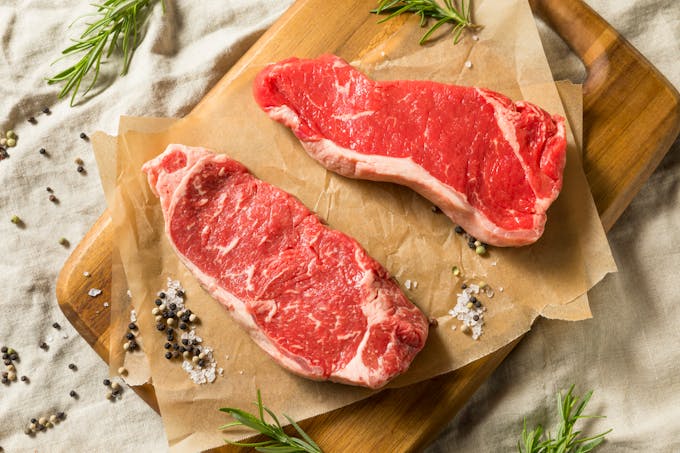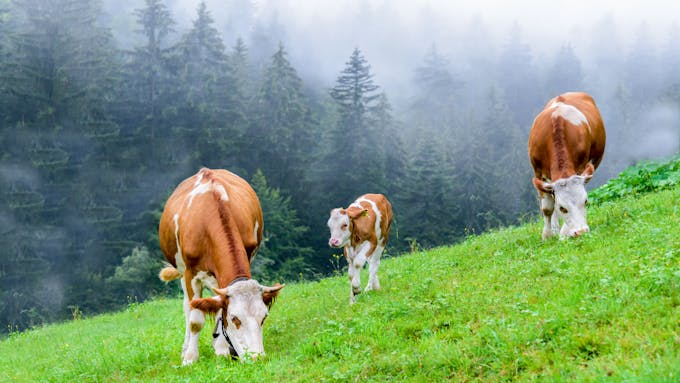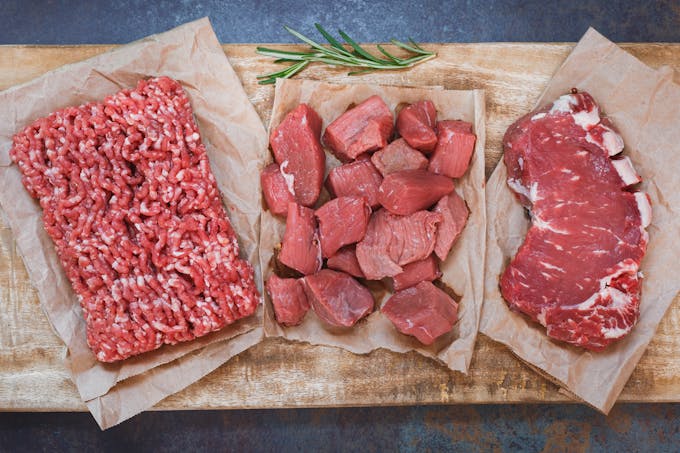Health Benefits of Grass-Fed Beef
Including high-quality red meat in your diet is great for your health. However, labels including grain-fed, grass-finished, or 100% grass-fed can be confusing and make it hard to choose the best beef product.
Find out why grass-fed beef is the best choice for your Healthy Keto® diet and how to pick the best beef products.

What is grass-fed beef?
Grass-fed beef comes from cows raised on grass, not grain. Grass-fed cattle are typically grown on pastures where they can graze and forage, resulting in more nutrient-dense meats than grain-fed beef.
Pasture-raising and grass-feeding beef has significant environmental benefits and is a more ethical and sustainable farming method.
What is grass-finished beef?
Grass-fed meat comes from livestock fed with grass at some point during its lifespan. It's common practice to grass-feed calves after weaning and introduce grains during the last few months of the cow's life to maximize growth.
Grains are more energy dense than grass and are used to grow and bulk-out cattle quickly. The quality of grain-finished beef is different from 100% grass-fed meat. To ensure you choose the best quality products, look for meat labeled grass-finished or 100% grass-fed.
The term grass-fed isn't a legal certification and doesn't indicate grass-feeding duration. Only beef products labeled grass-finished specify that the animals were fed on grass for their entire lives.
Watch the video below to learn more about why grass-fed products are the best choice for your Healthy Keto diet.
Grass-fed vs. grain-fed products
Cows that graze and forage on pastures are in their ideal habitat and benefit from consuming a natural, grass-based diet. In contrast, conventional grain-fed beef doesn't have pasture access, is housed in large agriculture structures, and is typically raised on an unnatural diet of soy and corn.
Grains provide more calories than grass, and grain-feeding cattle results in rapid growth, achieving more profit.
It can take up to 30 months to grow beef on grass but only around 15 months to mature grain-fed cattle. This explains why grain-fed products are generally cheaper than 100% grass-fed beef.
Grass-fed beef has better flavor and is nutritionally superior to meat from grain-fed animals. It contains higher levels of healthy fat and is an excellent source of nutrients and minerals.
Grain-feeding cattle doesn't just impact the meat’s flavor and nutrients. Grains are an unnatural food for cattle and often lead to health issues, including digestive problems and an increased need for antibiotics and other medical treatments.
Is grass-fed beef organic?
Grass-fed isn’t the same as organic beef. To certify a product as organic, farm operations must satisfy these standards set by the USDA:
No use of growth hormones
No use of antibiotics
Livestock must have access to a natural environment
Feed must be 100% organic and free of GMO ingredients
Many farms that practice responsible grass-feeding are also certified organic. Grass-fed vs. organic beef is not necessarily the same all of the time. Check food labels and choose 100% grass-fed or grass-finished and 100% certified organic for the most nutritious and ethically raised meat products.

Four reasons why you should switch to grass-fed beef
Grass-fed beef is rich in healthy fats and contains more nutrients than conventional grain-fed beef.
Its many health benefits are hard to ignore—here are four reasons why you should eat grass-fed beef.
1. Reduced disease risk
Grass-fed beef products have better fatty acid profiles than grain-fed meats. They contain healthy saturated fat, have lower amounts of inflammatory omega-6 fats, and are rich in heart-healthy omega-3 fats.
Omega-3 fats help to lower inflammation, and clinical nutrition research suggests that eating grass-fed meat reduces the risk of developing inflammation-related diseases, including heart disease, eczema, and cancer.
2. Better nutrition
Red meat from grass-fed cows is rich in B vitamins and vitamins A, E, and K. Organ meats from grass-fed cattle are particularly rich sources of these nutrients.
Grass-fed beef contains carotenoids, a potent antioxidant derived from the pigment of grass. Carotenoids have powerful antioxidant properties that may protect your body from premature aging and disease.
3. Lower cancer risk
Meat from grass-fed cattle is rich in conjugated linoleic acid (CLA), a fatty acid that may protect from certain cancers.
Research found that women who consume CLA-rich foods like grass-fed meat and dairy have a reduced risk of colon and breast cancer.
4. GMO-free
Grain-fed beef is generally raised on GMO crops, including corn and soy.
Opt for grass-fed meat whenever possible to lower the risk of potential adverse health implications of genetically modified foods like fertility problems, gastrointestinal symptoms, and impaired liver health.

Key takeaways
Grass-fed cattle benefit from a natural diet of foraging and grazing on pastures. This farming method produces nutritious meat with many health benefits and is rich in anti-inflammatory fatty acids, vitamins, and antioxidants.
Choose organic, 100% grass-fed beef for the best quality meat that is GMO-free, raised ethically, and more environmentally friendly than grain-fed beef products.
To learn more about the healthiest foods high in nutrition check out our healthy keto food list.
FAQs
1. Is grass-fed beef good for you?
Yes, grass-fed beef has several health benefits and is an excellent choice to support your body. Clinical nutrition research indicates that consuming grass-fed meat can lower the risk of developing inflammation-related conditions, including heart disease, eczema, and cancer.
Grass-fed beef contains healthy saturated fat and more nutrients than grain-fed beef. It’s a rich source of iron needed for healthy blood cells and prevents anemia.
2. Is grass-fed beef better than normal beef?
Yes, grass-fed beef is better than normal, conventionally farmed beef. It contains more nutrients and has a healthier fatty acid profile, including higher amounts of anti-inflammatory omega-3 fats.
Regular beef is typically raised on GMO feed containing soy and corn. In contrast, grass-finished beef benefits from a natural diet of grazing on pastures. This produces healthier meat and is more ethical and environmentally friendly.
3. What are the benefits of grass-fed beef?
Grass-fed beef is a rich source of nutrients, including vitamins A, E, and K, iron, and carotenoids. Carotenoids are potent antioxidants that may protect from cancer and Alzheimer's disease.
Compared to normal beef, grass-fed beef is rich in healthy saturated fat and anti-inflammatory omega-3 fatty acids. Consuming grass-fed meat helps to lower the risk of inflammatory conditions, including eczema, heart disease, and cancer.
4. What are the benefits of grass-fed products?
Grass-fed beef products are GMO-free and have been raised on pastures grazing on a natural diet. Meat science confirms that grass-feeding results in better nutrient levels and healthier fats.
Grass-fed meat has several health benefits, including lowering the risk of heart disease and certain cancers, and may protect against Alzheimer's disease.
5. Are grain-fed animal products unhealthy?
Grain-fed animal products are typically raised on an unnatural diet to grow and mature livestock fast. This results in meat products that are higher in inflammatory omega-6 fatty acids and contain lower levels of essential nutrients than grass-fed beef.
6. Is grass-fed beef the same as grass-finished beef?
No, grass-fed isn't the same as grass-finished. The grass-fed label indicates that the cattle had access to grass and pastures at some point during their lifespan.
It's common practice to grass-feed young cows but switch them to grain-based feeding during the final month to maximize growth before slaughter. In contrast, grass-finished, or 100% grass-fed, indicates that cattle were raised only on grass for their entire lives.
7. Is grass-fed the same as organic?
No, grass-fed beef isn't guaranteed to be organic meat. To be certified organic, the farming operations must avoid using growth hormones and prophylactic antibiotics and are required to provide GMO-free feed to livestock.
Many farms raising grass-fed beef also practice organic farming methods. Opt for grass-finished, organic beef products whenever possible to get the best-quality and most nutritious meat.
Previous blog
Low Gut Microbes Could Cause Anxiety and StressTags

Popular
08/21/2024
55K views
02/23/2025
46.3K views
11/18/2024
277.7K views
03/18/2024
11/21/2022




